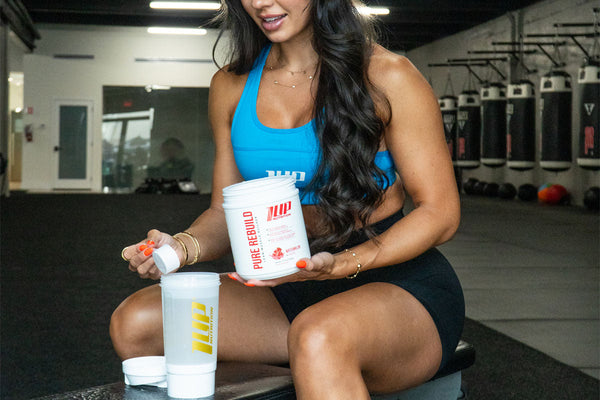Protein powder and creatine are two of the most popular supplements among fitness enthusiasts. They can be taken pre workout, post workout, or any other time of day to support recovery, muscle growth, and overall health and well-being.
But, is there an “optimal” time to take creatine or protein to get even better results?
That’s exactly what we’re going to discuss today.
First, let’s start with the basics.
What is Creatine?
Creatine is a naturally occuring substance in the body made from the amino acids, glycine and arginine.[1,2] It can also be obtained through the diet from foods such as beef, salmon, herring, and pork; however, you would need to eat several pounds of meat per day to reach the recommended 3-5 grams per day.
A more budget-friendly option is to supplement with creatine. While there are many forms of creatine supplements available on the market, no form has been more thoroughly studied or proven effective than creatine monohydrate. It’s also the most affordable form of creatine, too!
Our preferred creatine supplement is 1UP Pure Rebuild, which contains a full 5,000mg creatine monohydrate per serving (alongside other valuable recovery supplements, including L-Glutamine, betaine anhydrous, essential amino acids, and electrolytes).
What Does Creatine Do?
Creatine supports ATP production, which helps to replenish cellular energy and allows your muscles to perform at a higher level for longer before fatigue sets in. In other words, it’ll help you knock out a few more reps before needing to rack the weight and rest. This helps you perform higher training volumes which are linked with increased muscle and strength gains.
Second, creatine acts as an osmolyte, which aids hydration.
While creatine is renowned for its role in athletic performance and muscle growth, it also plays a critical role in cellular metabolism, particularly during metabolically stressed states. Furthermore, limitations in the body’s ability to transport and/or store creatine can impair metabolism.[3]
Newer research find that creatine also supports cognitive function, mood, and immune function.[4,5,6] It may even help you stay more alert after a poor night’s sleep (though this isn’t an excuse to regularly skimp on quality shut eye).[7]
What is Protein?
Protein is an essential macronutrient that plays a vital role in muscle recovery and growth -- it provides the literal “building blocks” (essential amino acids, EAAs) that your body needs to repair and build new tissue.
What Does Protein Do?
Our bodies also need protein to support immune function, digest food, heal wounds, synthesize hormones, and build neurotransmitters.
Protein sources are classified as either “complete” or “incomplete” depending on the EAA profile. Complete proteins contain all nine EAAs the body requires to stimulate protein synthesis and sustain it. Incomplete proteins, on the other hand, are lacking in one (or more) of the EAAs.
Animal-based proteins, including beef, poultry, wild game, fish, shellfish, eggs, and dairy are sources of complete proteins along with select plant-based proteins, including soy and pea protein.
In addition to “whole food” sources of protein, you can also use protein powder to meet your daily needs. Protein powders come in a variety of options, including juice like Clear Protein , ISO Protein , Whey Protein and Vegan Plant Protein, options.
Similar to creatine, protein powder supplements have been found to support muscle recovery and growth. They’ve also been found to support weight loss, cardiometabolic health, and immune function.[8,9,10]
How Much Protein Do I Need?
Active individuals have higher protein requirements than sedentary individuals as well as those who only “casually” exercise. The reason for this is that strenuous physical activity creates microtears in muscle fibers. To repair this damage and build stronger muscle tissue, your body needs protein. The more rigorous your training, the higher your protein requirements are.
A good rule of thumb for individuals engaged in resistance training looking to build muscle or lose fat is to consume 1-1.2 grams of protein per pound of body weight.
Should I Take Creatine or Protein Post Workout?
The simple answer is yes.
Creatine or protein powder can be beneficial post workout. In fact, numerous studies have been conducted investigating the benefits of post workout creatine or post workout protein supplementation and found that they enhance recovery, subsequent performance, and lean mass gains.
The more nuanced answer is that you can take creatine and/or protein post workout, but you don’t “have” to take either/or. It really boils down to what your nutrition and supplementation was during the hours before your workout.
If you woke up and immediately started your workout without any food, then it’s definitely a good idea to have protein after your workout as it helps to stop protein (muscle) breakdown and kickstart muscle recovery.
But, if you have eaten several whole food meals, including one an hour or two before your workout, then your body is full of carbohydrates and amino acids to fuel recovery and growth after your workouts. In this case, your post-workout shake won’t make massive differences in your recovery or growth (since you still have amino acids circulating in your bloodstream), but it’s not doing any harm either.
Concerning creatine, pre workout vs post workout supplementation has been studied only a few times and the differences in results aren’t substantial, especially if you’re not a competitive athlete or bodybuilder (i.e. most of us that hit the gym each day). The more important thing is to take your creatine supplement consistently. So if that's the first thing in the morning, great! If it’s before bed, great!
If it’s mixed into your pre workout supplement, also great! And, if it’s mixed into your post workout shake (alongside your scoop of protein powder)...great!
Whatever time during the day is most convenient for you to take creatine is the “best.”
Takeaway
Creatine and protein powder are both quality supplements, backed by hundreds of scientific studies. They both support muscle recovery and growth as well as offer a number of other health and performance benefits.
When you take them depends on several factors, including how many meals you eat per day, daily protein needs, and how close your last meal was in relation to your workout.
Regardless, many of our consumers find it helpful (and convenient) to have a serving of creatine with his/her post-workout protein shake. So, next time you finish a workout make sure to toss a scoop of 1UP Pure Rebuild into your shaker alongside a scoop of your favorite 1UP Protein Powder!
References
- Persky AM, Brazeau GA. Clinical Pharmacology of the Dietary Supplement Creatine Monohydrate. Pharmacol Rev. 2001;53(2):161 LP-176.
- Bird SP. Creatine Supplementation and Exercise Performance: A Brief Review. Journal of Sports Science & Medicine. 2003;2(4):123-132.
- Kreider RB, Stout JR. Creatine in Health and Disease. Nutrients. 2021 Jan 29;13(2):447. doi: 10.3390/nu13020447. PMID: 33572884; PMCID: PMC7910963.
- SAITO, S., CAO, D.-Y., OKUNO, A., LI, X., PENG, Z., KELEL, M., & TSUJI, N. M. (2022). Creatine supplementation enhances immunological function of neutrophils by increasing cellular adenosine triphosphate. Bioscience of Microbiota, Food and Health, 41(4), 185–194. https://doi.org/10.12938/bmfh.2022-018
- Slankamenac, J., Ranisavljev, M., Todorovic, N., Ostojic, J., Stajer, V., & Ostojic, S. M. (2023). Effects of six-month creatine supplementation on patient- and clinician-reported outcomes, and tissue creatine levels in patients with post-COVID-19 fatigue syndrome. Food Science & Nutrition, 11, 6899–6906.https://doi.org/10.1002/fsn3.3597
- Konstantinos Prokopidis, Panagiotis Giannos, Konstantinos K Triantafyllidis, Konstantinos S Kechagias, Scott C Forbes, Darren G Candow, Effects of creatine supplementation on memory in healthy individuals: a systematic review and meta-analysis of randomized controlled trials, Nutrition Reviews, Volume 81, Issue 4, April 2023, Pages 416–427, https://doi.org/10.1093/nutrit/nuac064
- Dworak, M., Kim, T., Mccarley, R.W. and Basheer, R. (2017), Creatine supplementation reduces sleep need and homeostatic sleep pressure in rats. J Sleep Res, 26: 377-385. https://doi.org/10.1111/jsr.12523
- Yang J, Wang HP, Tong X, Li ZN, Xu JY, Zhou L, Zhou BY, Qin LQ. Effect of whey protein on blood pressure in pre- and mildly hypertensive adults: A randomized controlled study. Food Sci Nutr. 2019 Apr 21;7(5):1857-1864. doi: 10.1002/fsn3.1040. PMID: 31139400; PMCID: PMC6526665.
- Frestedt JL, Zenk JL, Kuskowski MA, Ward LS, Bastian ED. A whey-protein supplement increases fat loss and spares lean muscle in obese subjects: a randomized human clinical study. Nutr Metab (Lond). 2008 Mar 27;5:8. doi: 10.1186/1743-7075-5-8. PMID: 18371214; PMCID: PMC2289832.
- Ha DJ, Kim J, Kim S, Go GW, Whang KY. Dietary Whey Protein Supplementation Increases Immunoglobulin G Production by Affecting Helper T Cell Populations after Antigen Exposure. Foods. 2021 Jan 19;10(1):194. doi: 10.3390/foods10010194. PMID: 33477967; PMCID: PMC7835905.






